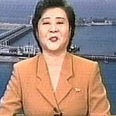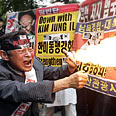

N. Korea says willing to resume nuke talks
Official says Pyongyang is willing to return to international arms talks, abandon its atomic program if US takes 'corresponding measures'; New York Times quotes federal, private analysts as saying test appears to have been small nuclear detonation; some experts say explosion was of conventional weaponry
According to the New York Times, federal and private analysts said the North Korean test appears to have been a nuclear detonation but was fairly small by traditional standards, and possibly a failure or a partial success.
The New York Times report said that in the past the first detonations of aspiring nuclear powers have tended to pack the destructive power of 10,000 to 60,000 tons — 10 to 60 kilotons — of conventional high explosives; but scientists monitoring the global arrays of seismometers that detect faint trembles in the earth from distant blasts said the strength of the North Korean test appears to have been a small fraction of that: Around a kiloton or less.
“We have assessed that the explosion in North Korea was a sub-kiloton explosion,” the New York Times quoted an intelligence official as saying.
The official said it will probably take several days to determine with confidence if the explosion was in fact nuclear, adding that so far, sensors had not detected radiation leaking from the blast site.
But according to the New York Times, federal and private experts said it seemed unlikely that North Korea had faked an underground nuclear blast with a large pile of conventional high explosives.
A North Korean official said Pyongyang is willing to return to international arms talks and abandon its atomic program if the US takes "Corresponding measures," South Korea's Yonhap news agency reported Tuesday.
"The nuclear test is an expression of our intention to face the United States across the negotiating table," the unnamed official said, according to a Yonhap report from
Beijing.
"What we want is security of the (North), including guaranteeing our system."
Security Council condemnation
According to the report, the United States Geological Survey said it had detected a tremor on the Korean Peninsula of 4.2 magnitude, which translates into an explosive force of roughly 1,000 tons.
Facing the prospect of a nuclear-armed North Korea, President George W. Bush called the communist regime's claim of a nuclear test a provocative act and has warned Pyongyang against exporting nuclear materiel.
"Once again, North Korea has defied the will of the international community, and the international community will respond," he said Monday. Other world leaders joined Bush in calling for an immediate and harsh rebuke from the United Nations against North Korean leader Kim Jong Il.
In the past 24 hours Bush spoke with the leaders of China, Japan, South Korea and Russia, America’s partners in the nuclear talks with North Korea.
Following a 30-minute emergency meeting on Monday, the UN Security Council decided to condemn North Korea's claim of a nuclear test, demanding that it return to six-party talks on its weapons program.
The US submitted a draft resolution calling for increased sanctions against North Korea, which might involve economic measures, breaking diplomatic ties and banning the import or export of military equipment or even a naval blockade.
Associated Press contributed to the report















